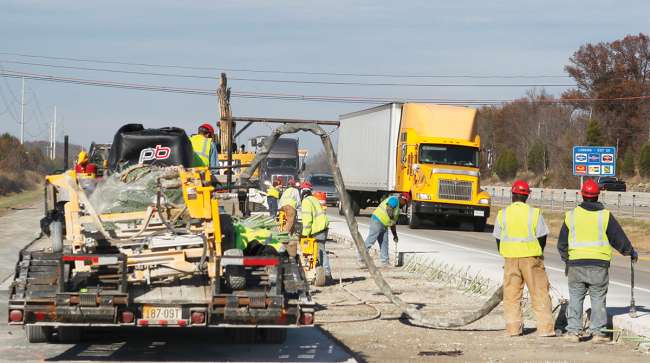Staff Reporter
ASCE Pushes to Make Infrastructure Funding Congressional Priority

As Infrastructure Week inches nearer, the nation’s oldest engineering group is continuing its efforts to promote transportation funding legislation.
The American Society of Civil Engineers began its push in support of a federal infrastructure funding package when Congress gaveled Jan. 3. Since then, the group has commanded a multipronged effort to raise awareness about infrastructure needs and urge lawmakers to craft legislation that would fund infrastructure projects. Attention surrounding such projects will reach a fever pitch during the annual Infrastructure Week, which is scheduled for May 13-20 with events in Washington and across the country.

Brian Pallasch, managing director of government relations and infrastructure initiatives for ASCE, recently offered an update on the group’s efforts.
He said one highlight was the group’s legislative fly-in, for which 260 ASCE members representing all 50 states, Puerto Rico and Washington descended on the nation’s capital in mid-March. These members, who include engineers and academics, met with their congressional representatives to advocate for infrastructure needs, including a funding bill.
“For us, that was a high-water mark in terms of the number of folks at our fly-in,” Pallasch told Transport Topics. “We see that as a positive sign of the interest level of our members and their willingness to come to town and talk to their legislators about the focus of infrastructure.”
ASCE routinely publishes infrastructure report cards for states, regions and the country. In addition to displaying wide-scale infrastructure needs (the country as a whole earned an overall D+), Pallasch noted that the report cards can drive the message for transportation funding at the local level. The group has released seven state and regional cards since Jan. 3.

Pallasch
He said the report cards’ basic grading scheme and digestible format helps members of Congress understand infrastructure problems, which in turn helps those legislators communicate the issues to their constituents.
ASCE’s goal is to meet with every freshman member of Congress and conduct “boots on the ground” meetings with members when they’re home on recess. So far, ASCE representatives have conducted more than 300 congressional visits, meeting with all 100 senators and about half of the freshmen members of the House.
“It’s one thing for all of us in Washington, D.C., to sit here and tell them what to do, but it’s even more effective if we can get their constituents back home to come out and start talking about why we actually really need to be focused on infrastructure investment,” Pallasch said.
ASCE also has made its case known before various congressional committees, including a House Appropriations subcommittee on transportation and the House Ways and Means Committee, to which longtime ASCE member Gregory DiLoreto testified alongside American Trucking Associations President Chris Spear.

Spear
The group also has conducted several media outreach efforts, including op-eds and radio appearances. An advertising campaign on Capital Bikeshare, Washington’s 4,300-strong bikeshare service, is still to come.
Pallasch said finding a fix to the flagging federal Highway Trust Fund should be a top priority for legislators. The federal fuel tax has stagnated at 24.4 cents a gallon for diesel and 18.4 cents a gallon for gasoline since 1993. ASCE, similar to ATA, supports an increase to the motor fuel tax as a financing solution.
One of ASCE’s most salient messages revolves around concern for public health and safety. Pallasch listed clean water and sound transportation systems as aspects of infrastructure that directly impact the well-being of those who use them. He also said good infrastructure can lead to economic improvement, citing the American Transportation Research Institute’s list of top truck bottlenecks as areas in which commerce can be moved more efficiently.
“Truckers can’t get goods to market or move goods through the supply chain,” Pallasch said. “But also, everyday citizens are impacted by traffic congestion or potholes that pop your tires and bend your rims or break your axles. Those things are real, they happen, and they’re terribly unpleasant.”
Infrastructure Week is right around the corner! Do you want to #BuildForTomorrow? Check out the growing list of events happening across the U.S. https://t.co/Ra102L1G8U @InfraWeek #InfrastructureNow pic.twitter.com/2c7J1Nmdg2 — ASCE Headquarters (@ASCETweets) April 11, 2019
ASCE is one of several groups, including ATA and the American Road and Transportation Builders Association’s Transportation Construction Coalition, that has launched a campaign for infrastructure legislation.
“It’s really time for Congress to focus on something that’s a win-win for the American people,” Pallasch said. “Now it’s time for Congress to put some pen to paper and start working with some of the stakeholders and working with the administration to actually start solving the problem.”

